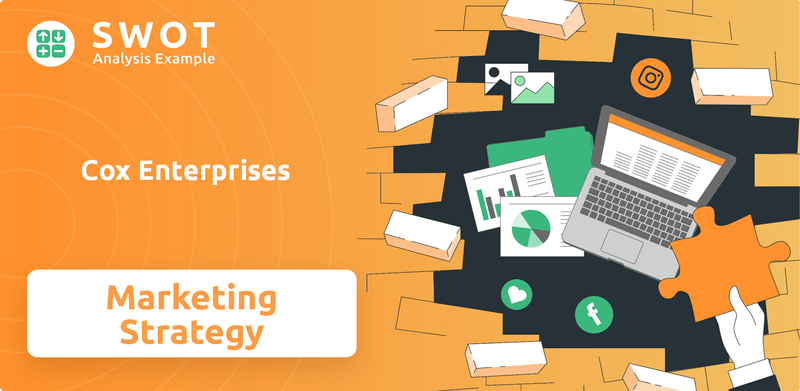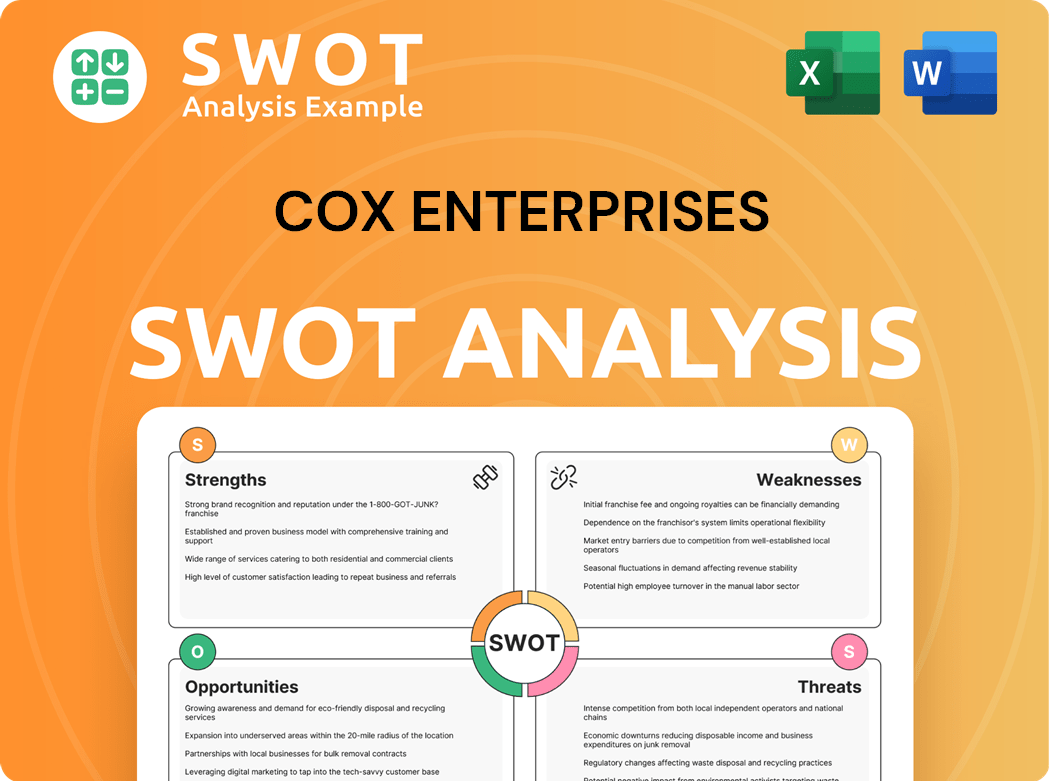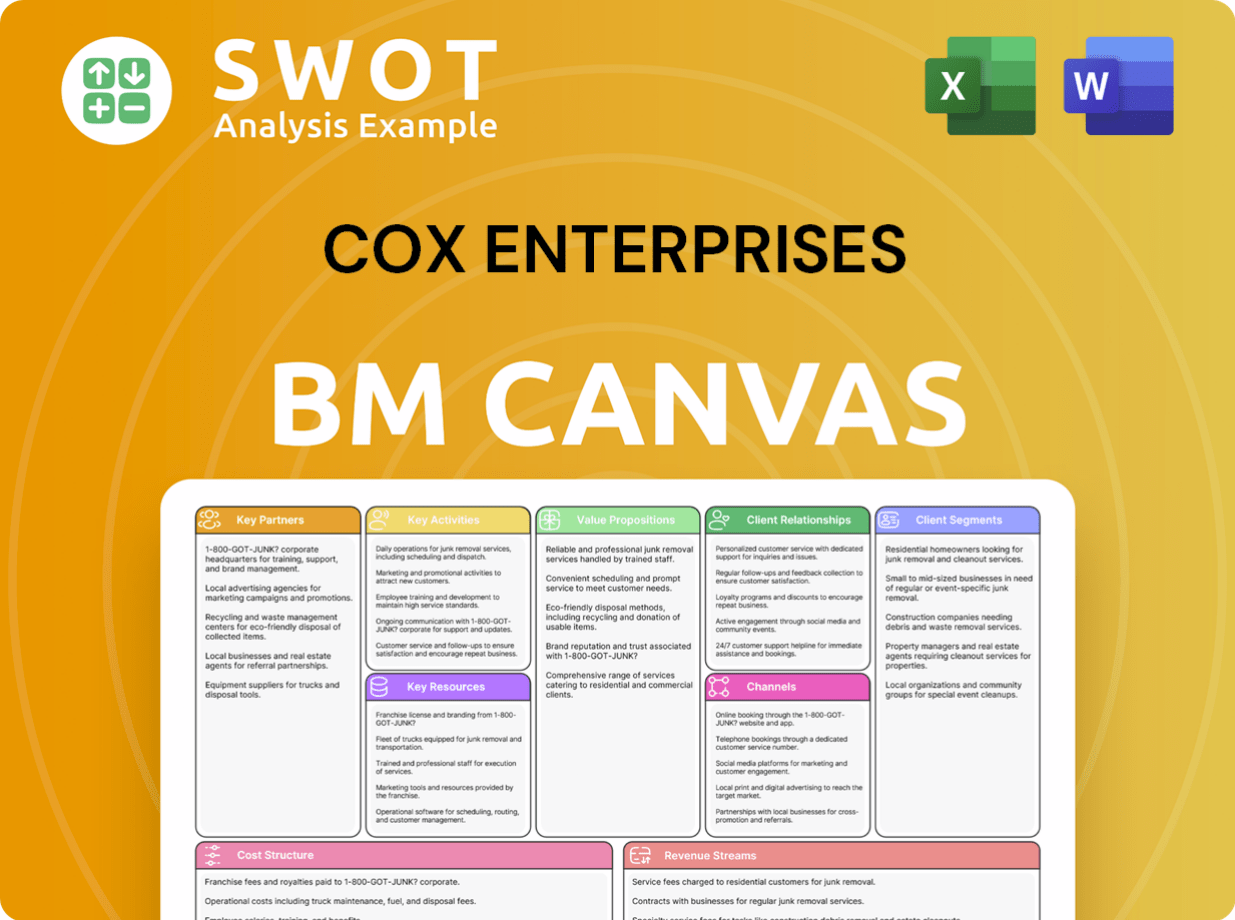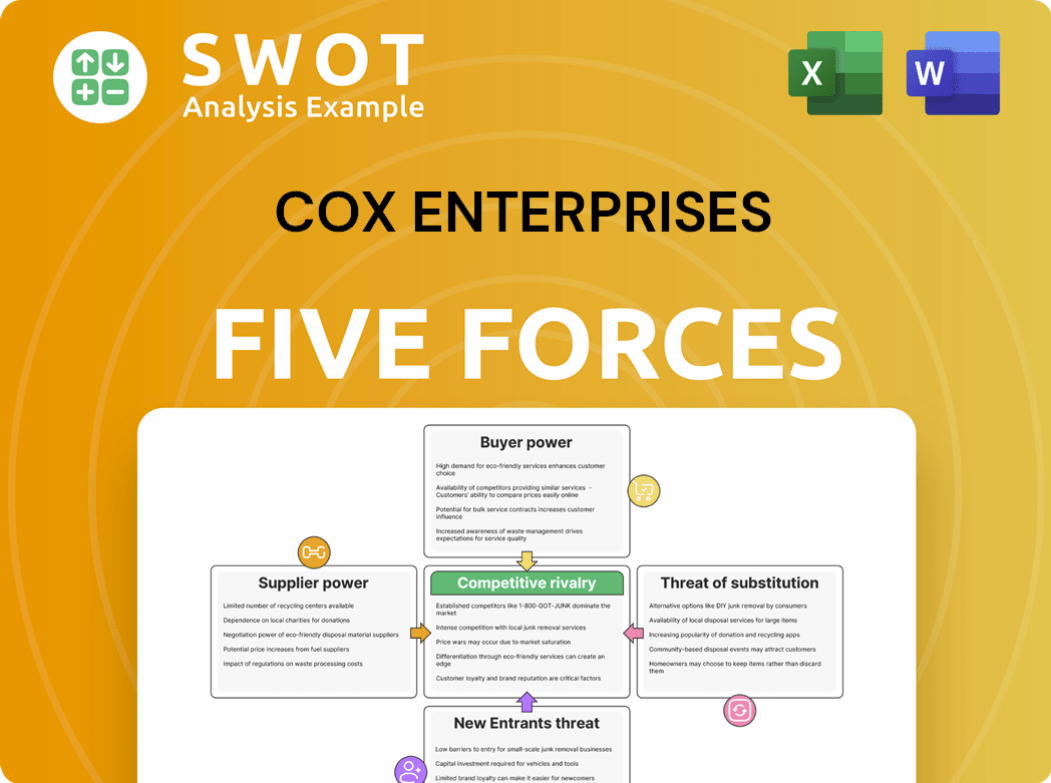Cox Enterprises Bundle
How Does Cox Enterprises Dominate Its Markets?
Cox Enterprises, a $23 billion powerhouse, has thrived for over a century by mastering sales and marketing. From its media roots to its diverse portfolio including Cox Communications and Cox Automotive, understanding their strategies is key. This analysis dives deep into the tactics that fuel their growth and industry leadership.

This exploration will unravel the Cox Enterprises SWOT Analysis, revealing how they deliver products and services, and the innovative marketing tactics across segments. We'll examine their brand positioning, and key campaigns driving growth in the competitive landscape. Discover the secrets behind Cox Enterprises' success, from Cox Communications business strategy to their effective customer acquisition and retention methods.
How Does Cox Enterprises Reach Its Customers?
The sales strategy of Cox Enterprises is multifaceted, employing a mix of digital and traditional channels to reach its diverse customer base. This approach is tailored to the specific needs of each business segment, ensuring effective market penetration and customer engagement. Understanding the sales channels is crucial for analyzing the company's overall business model and its ability to compete in dynamic markets.
For Cox Communications, the focus is on acquiring and retaining subscribers for broadband, cable, and telephone services. Cox Automotive, on the other hand, leverages digital platforms like Autotrader and Kelley Blue Book, along with physical locations for vehicle remarketing. This strategic diversity allows Cox Enterprises to adapt to changing consumer behaviors and market dynamics, ensuring sustained growth and market share.
The company's approach to sales and marketing is heavily influenced by its competitive landscape and the evolving preferences of its target audience. The following sections detail the specific sales channels employed by Cox Enterprises and the strategies used to maximize their effectiveness. For more insights, you can also explore the Growth Strategy of Cox Enterprises.
Cox Communications utilizes direct sales teams and its company website for customer acquisition and retention. The telecommunications arm faces significant competition from fixed wireless access (FWA) and fiber-to-the-home (FTTH) providers. This competitive pressure necessitates a strong focus on customer migration to higher-speed services.
While specific e-commerce figures are not readily available, the industry indicates a strong shift towards digital adoption. Cox is adapting to this trend by focusing on online sales and customer service. Digital channels are increasingly important for lead generation and customer engagement.
Cox Mobile, the company's nascent wireless business, anticipates substantial growth in 2024, projecting a 300% to 400% increase compared to 2023. This growth is primarily driven through an MVNO arrangement with Verizon. The strategy includes targeted marketing campaigns and competitive pricing to attract customers.
The competitive environment is impacting Cox Communications, with projections of a 3.5% decline in high-speed data subscribers in 2024 and a 1% decline in 2025. This necessitates a focus on customer retention and upselling higher-speed internet plans. Cox is also investing in its wireless business to diversify revenue streams.
Cox Automotive relies heavily on digital platforms such as Autotrader and Kelley Blue Book. These platforms are integral e-commerce tools for car shoppers, playing a crucial role in the vehicle purchase journey. Physical retail locations, particularly for vehicle remarketing through Manheim, are also vital.
- Digital platforms are essential for initial customer engagement.
- Physical locations, like Manheim, support vehicle remarketing.
- Partnerships and exclusive distribution deals enhance market position.
- Data-driven insights provided to dealers through platforms like Dealer.com improve sales effectiveness.
Cox Enterprises SWOT Analysis
- Complete SWOT Breakdown
- Fully Customizable
- Editable in Excel & Word
- Professional Formatting
- Investor-Ready Format

What Marketing Tactics Does Cox Enterprises Use?
The marketing tactics employed by Cox Enterprises are diverse, encompassing digital and traditional strategies to build brand awareness, generate leads, and drive sales. These tactics are tailored to the specific needs of each business unit, such as Cox Automotive and Cox Business, ensuring a targeted approach to reach different customer segments.
Digital marketing plays a crucial role, with content marketing, SEO, paid advertising, email marketing, influencer partnerships, and social media platforms being extensively utilized. Traditional media, including TV, radio, and print, also remain part of the marketing mix, particularly for broad reach and brand building. The company is increasingly focused on data-driven marketing, customer segmentation, and personalization to optimize campaign performance and ROI.
The company's approach to marketing is constantly evolving to adapt to changes in consumer behavior and technological advancements. This includes leveraging AI to enhance customer experience and utilizing advanced analytics tools to measure the effectiveness of marketing campaigns. For example, the company's investment in search engine marketing and remarketing campaigns on social media platforms is a key part of the overall Cox Enterprises marketing strategy.
Digital marketing strategies involve content marketing, SEO, paid advertising, email marketing, influencer partnerships, and social media. These are extensively used to reach target audiences. For automotive businesses, diversifying messaging across incentives and customer experience is advised.
Traditional media, such as TV, radio, and print, is still part of the marketing mix. Multiscreen TV advertising is a critical strategy for automotive advertisers, allowing for continuous reach with targeted messages across various screens. This approach helps in broad reach and brand building.
Data-driven marketing, customer segmentation, and personalization are increasingly sophisticated. AI is used to boost productivity and enhance customer experience. Personalization is expected to become more widespread, driven by access to first-party customer data and appropriate marketing tools.
Cox Business utilizes AI to boost productivity and enhance customer experience. A March 2024 survey showed that two-thirds of small business owners invested in AI. 53% plan to invest even more in 2024, highlighting the importance of AI in marketing.
Dealerships using personalized marketing saw a 12% increase in inventory leads. This demonstrates the effectiveness of personalized marketing. Technology platforms and analytics tools optimize campaign performance and ROI.
The marketing mix has evolved to embrace addressable advertising. It is becoming more accessible and cost-effective due to programmatic ad buying. This allows for targeted advertising on various platforms.
The marketing tactics of Cox Enterprises are diverse, using both digital and traditional methods. Key tools and strategies include SEO, social media marketing, and data analytics to enhance customer engagement and drive sales. The company focuses on personalization and leveraging AI to improve customer experience.
- Search Engine Optimization (SEO): Used to improve online visibility and attract potential customers.
- Social Media Marketing: Utilized for brand building, customer engagement, and targeted advertising.
- Data Analytics: Employed to optimize campaign performance and ROI, with a focus on customer segmentation.
- AI Integration: Used to enhance customer experience and boost productivity, as seen in Cox Business.
- Personalized Marketing: Implemented to increase lead generation and improve customer engagement, as demonstrated by increased inventory leads.
Cox Enterprises PESTLE Analysis
- Covers All 6 PESTLE Categories
- No Research Needed – Save Hours of Work
- Built by Experts, Trusted by Consultants
- Instant Download, Ready to Use
- 100% Editable, Fully Customizable

How Is Cox Enterprises Positioned in the Market?
The brand positioning of Cox Enterprises centers on innovation, customer-focused solutions, and a strong dedication to sustainability. This approach helps the company distinguish itself in highly competitive markets. The core message emphasizes empowering people to build a better future, which resonates with a broad audience. The visual identity and tone of voice reflect a forward-thinking and reliable presence, reinforcing its commitment to long-term value.
Cox Enterprises uses a mix of innovation and social responsibility to attract its target audience. A key element of its strategy is the national sustainability program, Cox Conserves, launched in 2007, aiming for zero waste to landfill by 2024 and achieving carbon and water neutrality by 2034. This commitment is recognized, as seen in Newsweek's acknowledgment of Cox Enterprises as one of America's Greenest Companies in 2025. This focus on sustainability appeals to environmentally conscious consumers and investors, a growing segment in today's market.
Furthermore, Cox's '34 by 34 Initiative' aims to empower 34 million people by 2034 through technology access, education, employment skills, social equity, environmental sustainability, and health. This initiative reinforces the brand's image as a company dedicated to positive change. This strategy helps to strengthen its position in the telecommunications and automotive sectors, driving customer loyalty and market share. For more insights, you can explore the Brief History of Cox Enterprises.
The sales strategy focuses on providing customer-centric solutions across its diverse businesses. Cox Communications and Cox Automotive leverage their strong brand recognition to build customer loyalty. Consistent brand messaging and customer experience across channels are key to building trust and retention.
Marketing efforts emphasize innovation and social responsibility. The company uses digital marketing, social media, and content marketing to reach its target audience. Cox Communications marketing campaigns focus on customer engagement and value, while Cox Automotive highlights its commitment to EVs.
Cox Communications focuses on providing reliable telecommunications services. Their business model includes offering high-speed internet, TV, and phone services. They are constantly adapting to shifts in consumer behavior, especially in the digital space.
The Cox business model is diversified, with key segments in telecommunications and automotive services. This diversification helps to mitigate risks and capitalize on opportunities in different markets. Their focus on customer experience and innovation drives growth.
Cox Enterprises maintains a strong market share in the telecommunications and automotive sectors. This is achieved through a combination of strategic acquisitions, innovative service offerings, and robust customer retention strategies. The company's focus on customer satisfaction and technological advancements helps them maintain a competitive edge.
- Cox Communications has a significant market share in the cable and broadband industry.
- Cox Automotive is a leader in the automotive services market, including vehicle auctions and digital marketing solutions.
- The company's diversified portfolio and strong brand recognition contribute to its overall market share.
- Cox Enterprises' ability to adapt to changing market dynamics supports its continued success.
Cox Enterprises Business Model Canvas
- Complete 9-Block Business Model Canvas
- Effortlessly Communicate Your Business Strategy
- Investor-Ready BMC Format
- 100% Editable and Customizable
- Clear and Structured Layout

What Are Cox Enterprises’s Most Notable Campaigns?
The sales and marketing strategies of Cox Enterprises are driven by impactful campaigns designed to reinforce brand values and achieve specific business objectives. These initiatives span across various areas, including sustainability, social impact, and automotive sales, demonstrating a multifaceted approach to engage with customers and the wider community. The company's commitment to environmental stewardship and social responsibility is a key component of its overall Growth Strategy of Cox Enterprises.
A significant portion of Cox Enterprises' marketing efforts is allocated to campaigns that highlight its commitment to sustainability and community empowerment. These campaigns are designed to not only enhance brand perception but also to drive tangible results, such as reducing environmental impact and fostering social progress. These initiatives are communicated through various channels, including press releases and corporate responsibility reports, showcasing Cox's leadership in these areas.
Cox Automotive's marketing campaigns focus on adapting to the evolving automotive market. In 2024, this involved diversifying messaging to emphasize customer service and brand reputation, alongside incentives. For 2025, the strategy includes tactics to boost new car sales and clear out 2024 inventory, leveraging platforms like Autotrader and Kelley Blue Book.
The 'Cox Conserves' program is a long-term sustainability initiative that serves as a key brand-defining campaign. Its objectives include achieving zero waste to landfill and becoming carbon and water neutral. In 2024, Cox successfully achieved its zero waste to landfill goal, diverting an impressive 92% of waste at its corporate headquarters.
The '34 by 34 Initiative' is a social impact program designed to empower 34 million people to live more prosperous lives by 2034. As of December 2024, Cox had already empowered 10.6 million people through this initiative. This campaign utilizes community engagement, employee volunteerism, and strategic partnerships.
Marketing campaigns in 2024 focused on adapting to a buyer's market by diversifying messaging beyond incentives. Campaigns also emphasized investments in search engine marketing and remarketing on social media. The strategy aimed to maintain top-of-mind awareness throughout the long automotive buyer's journey.
For 2025, marketing strategy includes tactics to boost new car sales, merchandise sales events, and clear out 2024 inventory. This includes leveraging premium listings and spotlights on platforms like Autotrader and Kelley Blue Book. The goal is to capitalize on high interest in new car models.
Cox Enterprises Porter's Five Forces Analysis
- Covers All 5 Competitive Forces in Detail
- Structured for Consultants, Students, and Founders
- 100% Editable in Microsoft Word & Excel
- Instant Digital Download – Use Immediately
- Compatible with Mac & PC – Fully Unlocked

Related Blogs
- What are Mission Vision & Core Values of Cox Enterprises Company?
- What is Competitive Landscape of Cox Enterprises Company?
- What is Growth Strategy and Future Prospects of Cox Enterprises Company?
- How Does Cox Enterprises Company Work?
- What is Brief History of Cox Enterprises Company?
- Who Owns Cox Enterprises Company?
- What is Customer Demographics and Target Market of Cox Enterprises Company?
Disclaimer
All information, articles, and product details provided on this website are for general informational and educational purposes only. We do not claim any ownership over, nor do we intend to infringe upon, any trademarks, copyrights, logos, brand names, or other intellectual property mentioned or depicted on this site. Such intellectual property remains the property of its respective owners, and any references here are made solely for identification or informational purposes, without implying any affiliation, endorsement, or partnership.
We make no representations or warranties, express or implied, regarding the accuracy, completeness, or suitability of any content or products presented. Nothing on this website should be construed as legal, tax, investment, financial, medical, or other professional advice. In addition, no part of this site—including articles or product references—constitutes a solicitation, recommendation, endorsement, advertisement, or offer to buy or sell any securities, franchises, or other financial instruments, particularly in jurisdictions where such activity would be unlawful.
All content is of a general nature and may not address the specific circumstances of any individual or entity. It is not a substitute for professional advice or services. Any actions you take based on the information provided here are strictly at your own risk. You accept full responsibility for any decisions or outcomes arising from your use of this website and agree to release us from any liability in connection with your use of, or reliance upon, the content or products found herein.